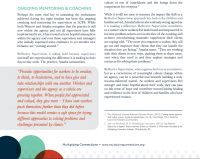
Both Wascow and Amaha report that the implementation of Reflective Supervision has had an ameliorating effect on both their own and their supervisees experiences of Secondary Traumatic Stress. “Workers feel heard in a more concrete way than they ever did before,” Amaha notes. “They know their issues are being discussed and this cuts down on their own stress levels.” Wascow adds, “It has transformed the culture to one of hopefulness and this brings down the temperature for everyone.”
While it is still too soon to measure the impact this shift to a Reflective Supervision approach has had on the children and families served, Amaha believes she is already seeing signs that it is making a difference. Reflective Supervision contributes to a culture where workers feel both heard and empowered to become problem-solvers even in the face of the crushing and at-times overwhelming traumatic experiences their clients are coping with. “The more you empower a worker, they will go out and empower their clients that they can handle the situation they are facing,” Amaha states. “They are working with their clients in new ways, pushing them to share more, vent when they need to and then explore strategies and resources for solving their problems.”
Reflective Supervision, when approached not as an initiative, but as a cornerstone of meaningful culture change within an agency, can be a powerful tool towards building a truly trauma-informed system. As workers and supervisors feel stronger and more hopeful about their work, they can pass on this sense of hope and contribute toward lasting healing and resilience in the lives of children and families who have experienced trauma.

